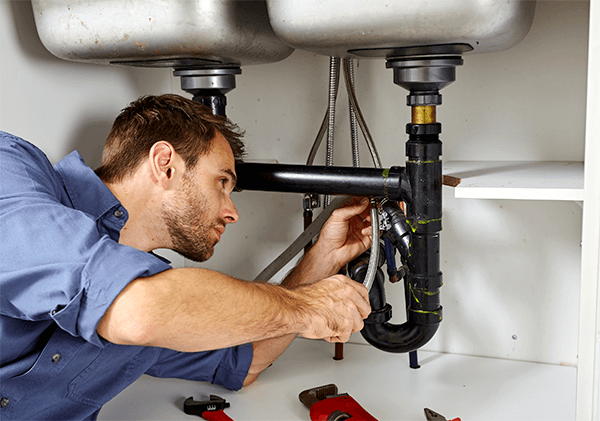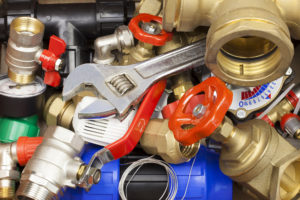Temporary Solutions for Pipe Issues: Key Steps to Take Until A Plumber Arrives
Temporary Solutions for Pipe Issues: Key Steps to Take Until A Plumber Arrives
Blog Article
Do you find yourself hunting for insight on Plumbing Emergencies: Tips on What To Do Before?

Pipes emergency situations can strike at any moment, creating stress and potential damages to your home. Whether it's a burst pipe, a stopped up drain, or a leaking tap, knowing exactly how to take care of the situation till a professional plumbing technician gets here can save you from more complications. This post gives vital emergency situation pipes tips to help you reduce damages and regain control during a pipes situation.
Turn Off the Supply Of Water
The primary step in any kind of pipes emergency is to turn off the water system. For local issues, such as a leaking tap or commode, turn off the valve near the fixture. When it comes to a significant leak or burst pipe, situate your home's major water shut-off valve and turn it off right away. Recognizing the area of these shutoffs beforehand can save important time throughout an emergency.
Address Little Leakages with Short-lived Fixes
Little leakages can quickly become considerable issues if left unattended. Utilize these momentary solutions up until specialist aid gets here:
While these fixes aren't permanent, they can help minimize water loss and damages.
Unclog Drains Pipes Securely
A clogged up drainpipe can be an irritating and unpleasant concern. Below's exactly how to tackle it:
If these methods don't function, prevent utilizing excessive force, as it might aggravate the obstruction.
Take Care Of Overflowing Toilets
An overruning bathroom can cause prompt turmoil. Right here's what you must do:
Shut Off Your Water Heater
In particular emergencies, such as a burst pipeline, it's smart to turn off your hot water heater. This stops getting too hot or damage to the device when water stops flowing. Shut off the power supply to the water heater (electrical or gas) and let it cool off to stay clear of prospective threats.
Briefly Quit a Burst Pipe
A ruptured pipe can bring about considerable water damages in minutes. To minimize the issue:
Call an expert plumber right away to address the issue completely.
Take Care Of Frozen Pipeline Meticulously
In colder climates, icy pipes are a common emergency. If you believe an icy pipe:
Prevent Further Damage
Taking quick activity to decrease damages can conserve you time and money over time. Right here's exactly how:
. Have an Emergency Situation Pipes Package
Prepare a standard plumbing emergency situation set to manage small concerns properly. Your package needs to consist of:
Having these tools available can make a significant difference in your ability to manage emergencies.
Know When to Call a Professional.
While quick fixes can help temporarily, particular pipes problems require immediate professional attention. Call a plumber if:.
Immediately calling an expert ensures the issue is settled appropriately and avoids further difficulties.
Final thought.
Plumbing emergencies can be frustrating, however with the best expertise and devices, you can handle the situation properly till assistance arrives. By switching off the water system, dealing with small leakages, and utilizing temporary solutions, you can reduce damage and maintain your home safe. Keep in mind, these pointers are short-term solutions; constantly speak with a qualified plumbing to take care of the source of the problem. Prep work and quick reasoning are your best allies in any kind of plumbing emergency situation.
8 Helpful Tips for Managing Plumbing Emergencies at Home
If your plumbing system hasn’t failed once, wait for it because almost everyone has a story to tell. Sometimes, it could be simple emergencies such as a leaking pipe, a blocked cistern, or even a big burst pipe. In situations like this, you need to have some handy tips to save you some money and from possible damages.
Take care of minor issues early.
Sometimes, you could have avoided an emergency by taking proactive measures while it was still early. Some major plumbing emergencies can be a result of an ignored minor issue. We recommend that you have items like plumbing tapes and other related items. A plumbing tape can allow you to manage minor leaks before the plumber arrives.
Cut off the water supply.
This tip is essential in almost any type of leakage problem. For problems like minor leakages in the toilet or kitchen, turn off the supply that takes water to the affected pipes. If the leakage is a major pipe, you must shut off the supply valve to the entire building. This will help you avoid flooding your home and neighbors if you share a flat.
Know your plumbing system
Folks typically move into a new apartment without understanding the water supply around the building. This can prove disastrous if a water emergency arises and the plumber is far away. The previous tip will prove useless if you don’t practice this one. More importantly, know where your water shut-off valve is located – you’ll need that knowledge to prevent potential home floods.
Have some common handy tools
There are lots of plumbing emergencies that you can handle without hiring a plumber. That’s why you must keep some tools available always. Some tools that you can use to fix simple plumbing emergencies easily include plumbing tapes, screwdrivers, thread seal tapes, plungers, pliers, tape measures, and rubber gloves.
Insulate your pipes from cold
You’ll save yourself from many plumbing expenses if you protect your water pipes from the cold. This is because of the harmful effects that cold weather can have on your pipes. During winter, your pipes can burst from being overly expected to freezing temperatures. So, make sure insulators are there to keep the pipes working correctly.
Avoid practices that will clog your toilet.
Many people indulge in practices that can damage the plumbing system of the entire building. One of these is when they use their toilet to dispose-off garbage. They flush all kinds of things, such as paper towels, bandages, hairs, female sanitary products, etc., down the toilet. This will block your toilet in the long run, incurring unnecessary expenditures. Dump such waste in the trash instead.
Check your dials regularly.
Sometimes, there could be leakages in your home without noticing them in time. So, constantly monitor your water meter dial. If the dial is reading when there is nobody using water, this is an indicator that there is leaking. Check for leaks immediately. Call a plumber as soon as possible if you can’t find any.
https://www.constructionplacements.com/8-helpful-tips-for-managing-plumbing-emergencies-at-home/

I was brought to that editorial on Plumbing Emergencies: Tips on What To Do Before from a good friend on our other website. Sharing is good. You just don't know, you may just be doing someone a favor. Thanks so much for going through it.
Click Here Report this page